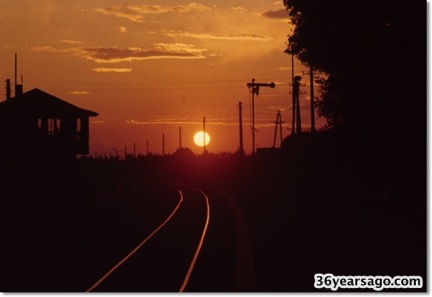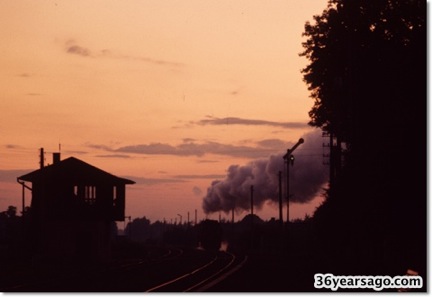Day 327: Arrival in Poland—what a day
36yearsago.com
Vienna 1971—A Student Journal
A year of music, study, travel, sightseeing &
friends.
Day
327 — Arrival in Poland—what a day
24-Jun-1972
(Sat.)
TRANSCRIPT

POLAND
Big, long, and confusing day. I am writing near the
end of it. Chronologically.
A little afraid before going. First time behind the
Iron Curtain.
Never have a couchette on a trip into an “iron
curtain” country because with all the red tape, you
barely get a chance to use it. They stuck in on
thick.
First, interrupted at the Austrian border for their
check. Then, three or four times at the entrance of
Czechoslovakia, and the same for Poland. It’s a pain,
but if everything is in order, there is no problem.
They are even basically friendly.
After a long and delayed ride, arrived in Katowice.
First
impression of Poland (Katowice)
Industrial town. Just about the ugliest thing I’ve
ever seen. Dull, cold, dirty, and gray. First thing
is that they don’t have the facilities we are used
to. Hardly any restaurants, stores, etc.
But the people are friendly. And even though there is
quite a language problem for me (it’s not tourist
country), things go all right, if sometimes, somewhat
aggravating. One lady was going to give me money for
a strassebahn.
Caught the train (an hour late) to Wroclaw. Only
standing room, and really packed. Perfect for a
headache and upset stomach. Only good thing was that
there were some good looking Polish girls next to me.
Wroclaw
A much different city. More pleasant, wide, and new.
A lot of young people. Busy. I had a little trouble
finding out how to get to Malomice. Got to the train
station.
Some
interesting observations:
(1) Long lines are the way of life. Aggravating for
someone used to service.
(2) So far, the girls I’ve seen have been really good
looking. Quite a bit of them. Wish I knew more
Polish.
(3) Short hair is more common than long. But a fair
number of students seem to have pretty good growths.
(4) They use mostly old “steam locomotives.” In fact,
the trains—not international—are not as nice or
comfortable as the western European countries. Train
to Malomice shook quite a bit.
(5) Scarry. At railroad stations, there are usually
guards with sub-machine guns strapped to their backs.
I sort of got the feeling that it would be very
simple for someone to be arrested. Rights. At least I
know that back home I can open my big mouth when I
want to.
(6) Another phenomenon: The drunks. I have seen quite
a few around. Not just drunk, but over-drunk in the
same manner that my father acted. In fact, a lot of
them could have been doubles—cannot walk right, etc.
I have only seen this here, mostly. Maybe it’s
because of the society.
Arrived
in Wroclaw. Went to other train
station.
Train
to Malomice. Idea of people and
country. Most people are basically friendly.
Especially the lady who sold me train tickets, and
the one who gave me the kielbasy.
Standing on the train, met two soldiers. Friendly,
but a very short conversation. I didn’t feel like I
was an antagonist. But impression I got was that they
were playing it up, and had more status here.
Stop at Lygnice. Nice square. Headache went away.
Nicest town so far.
On the train, teenagers giving candy to a little
baby. Funny—whole train was laughing.
Surprise.
After a long ride through beautiful country—mostly
farms—I finally arrive at Malomice and find out it is
the WRONG TOWN. The town I wanted to go to was NOT on
the map.
Backtracked to Lygnice. About to leave for Lubin. It
is 1:00 A.M.
REFLECTIONS
Real-life,
real-world. What a day
this appears to have been. I’m traveling from free
western Europe to communist Czechoslovakia and
Poland. Papers have to be checked. I am naïve and
have no idea was is coming down the road. All I know
is “I am going to Poland.” (How hard can that be?)
Remember that I am a “book-schooled” kid and now I am
heading into the real world, behind the Iron Curtain,
into a communist controlled society. Talk about
waking up to the fact that the world is not all
storybook fairytales. In the U.S., in 1970, you never
saw soldiers in uniform, let alone with machine guns,
and here it is, in Poland, the railroad stations and
borders have armed soldiers policing with machine
guns. That was an eye-opener.
Old
and new. I was
surprised at the differences in the cities that I
went through. The industrialized city appeared to be
terrible, while some of the more modern cities were
fine. I would guess that the industrialization was
similar to what the U.S. had gone through earlier in
its history. It takes a while for people to fight for
a better quality-of-life and living conditions, which
does not always happen at the onset of
industrialization. That there were nice towns and
lots of farms was a positive. Would Poland be
different today, over 36 years later? Cleaner? Better
quality of life? Certainly, yes.
People
are people. Thank
goodness that I learn that people everywhere are
basically good people. Friendly and helpful people. I
believe that this is the “good” that is in most of
us, in most of human nature. Imagine that one woman
was ready to help me by buying me a streetcar ticket.
Amazing. Everyone was willing to help an obvious
foreigner who didn’t speak much Polish. Seeing lots
of people on the bus, trains, and in towns was
interesting. I remember the mix of young people,
soldiers, and just regular people. Good looking
Polish girls seemed to catch my attention. Language
was the issue. Also, people are people—not
communists. They are dealt a hand and live their
lives, going to work, school, having friends and
raising families. And then there are the drunks. If
you have no hope or purpose, I suppose it’s easy to
go down that path. My father was an alcoholic.
Language.
I knew a
few phrases and words in Ukrainian. My mother was
born in Poland close to Ukraine. When I was young, we
would go to “Lemko” festivals—and so I suspect that
was the region of my mother’s birthplace. Most Polish
and Ukrainians can understand each other, but I was
using very basic Lemko phrases. When I wanted to get
a train ticket to Malomice, I might say “Dobre dehn.
Yak she mash. Ya hochu, kopuyou yeden ‘billet.’ Ya
hochu idu do Malomice.”
Steam locomotives and Malomice. When I
wanted to go to Malomice, to meet my relatives, I
went to the ticket office and spoke the above phrase
and showed the woman my invitation letter with the
Malomice address. She gave me the ticket. I got on
this “truly rickety” old wooden train with an
honest-to-goodness steam engine locomotive (see
picture) and headed to Malomice. I remember this day
and journey. It was cold and some windows were open
on the train—like out of an old movie. What happened?
Wrong Malomice. I went to a city called Malomice but
my relatives were in a village
called
Malomice, which was not on any map. I was in the
wrong part of the country. At any rate, in the early
evening, we figure it out and I wait for a train at
1:00 A.M. to head back towards the bigger city of
Lubin, closer to the place I wanted to go to.
The opening photo is of sunset at the train station
in the wrong
Malomice.
The photo below shows the train that I just got off
of.
Steam locomotive leaving Malomice,
Poland
City names. I know
that some of the city’s names are spelled wrong. I’ve
been checking with Google Maps and in many cases, I
have the spelling correct. However, in other cases
Google doesn’t recognize my spelling and when I
select an alternative, it is likely the wrong town.
The towns I am spelling correct are: Krakow, Warszawa
(Warsaw), Lubin, Tylawa, Malomice, and Katowice. The
towns I can’t find are: Lygnice, Loczno, and Olystyn.
Remember also that I went to the city of Malomice but
ended up in the village of Malomice. I still can’t
find the village, today. In addition to Lubin, there
is a Lublin. It is confusing. I may have to call my
relatives.
John
- - - -